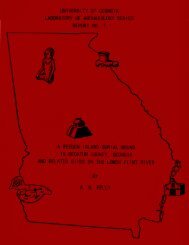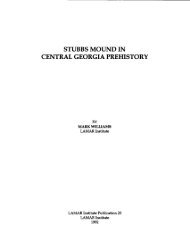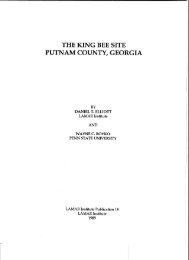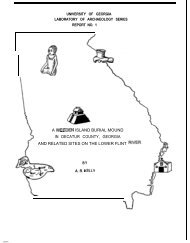Stirring Up a Hornet's Nest: - UGA Laboratory of Archaeology ...
Stirring Up a Hornet's Nest: - UGA Laboratory of Archaeology ...
Stirring Up a Hornet's Nest: - UGA Laboratory of Archaeology ...
You also want an ePaper? Increase the reach of your titles
YUMPU automatically turns print PDFs into web optimized ePapers that Google loves.
Alexander Garden, a Revolutionary War veteran, provided a discussion <strong>of</strong> “Boyd’s Defeat at Kettle Creek”<br />
(Garden 1822:86-87). Garden wrote:<br />
The successes <strong>of</strong> the British in Georgia, had great influence in arousing the hostile spirit <strong>of</strong> the tories in the upper districts <strong>of</strong><br />
South-Carolina, which had been smothered, but not extinguished. They had been encouraged to embody themselves, and<br />
cross the Savannah River, where they were told, that by uniting themselves to the British Regulars, so great a superiority <strong>of</strong><br />
force would be obtained, as to render resistance to the Royal Government abortive, and extinguish every symptom <strong>of</strong><br />
rebellion. A Colonel Boyd, a man <strong>of</strong> some influence, who had been effectually tampered with, undertook to be their Leader,<br />
and actually marched some hundreds <strong>of</strong> them across the Cherokee Ford, into Georgia. A more motly crew were never<br />
collected, being composed chiefly <strong>of</strong> persons distinguished by their crimes, and infinitely more anxious to plunder, and<br />
appropriate whatever <strong>of</strong> value they could lay their hands on to their own use, than to promote the good <strong>of</strong> the cause, and the<br />
interests <strong>of</strong> the Monarch, they pr<strong>of</strong>essed to admire and to serve. Colonel Pickens, always on the alert, collected about three<br />
hundred well-affected Militia, and immediately followed in pursuit. They had gained little or no advantage when he overtook<br />
them at Kettle Creek, where he attacked them with such impetuosity that after losing forty men, they became panic struck,<br />
and fled in every direction, leaving the whigs in possession <strong>of</strong> the battle-ground, and all the spoils collected on their march.<br />
Had they successfully joined their allies, there is no saying where the mischief would have ended; for, there was an<br />
abundance <strong>of</strong> inflammable material left behind, and the example <strong>of</strong> Boyd, might speedily have been followed up, on a more<br />
extensive scale <strong>of</strong> revolt, and with more decided effect. The promptitude <strong>of</strong> Col. Pickens, therefore, in collecting men, and<br />
bringing the contest to so successful an issue, does him great honour, and cannot be too highly commended. The prisoners<br />
taken were numerous, and seventy <strong>of</strong> them were condemned to die as traitors, but mercy tempered the exercise <strong>of</strong> rigid<br />
justice, and five only were executed (Garden 1822:86-87).<br />
Historian Paul Allen (1822, Volume II: 228) wrote an early history <strong>of</strong> the American Revolution in which he<br />
gave this battle summary:<br />
A party <strong>of</strong> them [tories and loyalists], with Colonel Boyd at their head, having crossed the Savannah, Colonel Pickens, with<br />
about 300 militia collected from the district <strong>of</strong> 96, followed them, and on the 14 th had a desperate engagement with them <strong>of</strong><br />
three quarters <strong>of</strong> an hour. Having lost their leader, and about 40 killed, they took to flight in every direction; a few <strong>of</strong> them<br />
were enabled to reach the British posts in safety, but the greater part, being citizens <strong>of</strong> South Carolina, were apprehended and<br />
brought to trial for treason, and five <strong>of</strong> the ringleaders executed.<br />
This check, together with the threatening attituded which General Lincoln had assumed, induced Colonel Campbell to<br />
abandon his position at Augusta on the very night <strong>of</strong> General Ashe’s arrival (Allen 1822, Volume II:228).<br />
Reverend Adiel Sherwood’s (1827, 1829) gazetteer <strong>of</strong> Georgia provided a brief listing <strong>of</strong> the battle <strong>of</strong><br />
Kettle Creek. Sherwood’s information <strong>of</strong>fers little specific details regarding the battlefield landscape. He<br />
noted that a, “bloody battle was fought on this creek”, where, “Col. Boyd commanded the British, & Cols.<br />
Pickens, Dooly, and Clarke the Americans, and obtained over their enemies a signal victory” (Sherwood<br />
1829:121).<br />
Italian historian Carlo Botta wrote this about the Kettle Creek battle prior to 1820:<br />
In order, therefore, to encourage and support the loyalists, they [the British troops] moved up the Savannah as far as Augusta.<br />
As soon as they were in possession <strong>of</strong> that post, they left no means unattempted that could re-animate their partisans, and<br />
excite them to assemble in arms They sent among them numerous emissaries, who exaggerated to them the might <strong>of</strong> the royal<br />
forces. They assured them that if they would but unite, they would become incomparably superior to their enemies; they were<br />
prodigal <strong>of</strong> promises and presents; they exasperated minds already imbittered by flaming pictures <strong>of</strong> the cruelties committed<br />
by the republicans. Such were the opinions propagated by the British generals among the friends <strong>of</strong> the king. Their<br />
instigations produced the intended effect; the loyalists took arms, and putting themselves under the command <strong>of</strong> colonel<br />
Boyd, one <strong>of</strong> their chiefs, they descended along the western frontiers <strong>of</strong> Carolina, in order to join the royal army. More<br />
properly robbers than soldiers, they continually deviated from their route, in order to indulge their passion for pillage. What<br />
they could neither consume nor carry <strong>of</strong>f, they consigned to the flames. They had already passed the Savannah, and were near<br />
the British posts, when they were encountered by colonel Pickens, who headed a strong detachment <strong>of</strong> Carolinians, levied in<br />
the district <strong>of</strong> Ninety-six. Instantly, the action was engaged with all the fury excited by civil rancor, and all the desperation<br />
inspired by the fear <strong>of</strong> those evils which the vanquished would have to suffer at the hands <strong>of</strong> the victors. The battle lasted for<br />
a full hour. At length the loyalists were broken and completely routed.<br />
Boyd remained dead upon the field; all were dispersed; many fell into the power <strong>of</strong> the republicans. Seventy were condemned<br />
to death; only five, however, were executed. This success made a deep impression throughout Georgia, where the disaffected<br />
were already on the point <strong>of</strong> arming against the congress. The incursions <strong>of</strong> the loyalists were repressed, and the republicans<br />
could proceed with greater security in their preparations for defense against the royal arms. Another consequence <strong>of</strong> it was,<br />
that the English evacuated Augusta, and, retiring lower down, concentered their force in the environs <strong>of</strong> Savannah (Botta,<br />
translated by Otis 1837, Volume II: 79-80).<br />
James Herring and James Barton Longacre (1836:4) provided an early biography <strong>of</strong> Andrew Pickens in<br />
which they recounted the battle <strong>of</strong> Kettle Creek. Regarding the battle’s significance, they wrote, “This<br />
23










